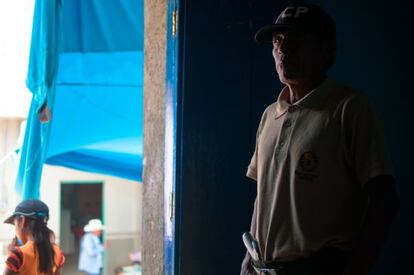Mexican authorities remain silent after three days of violence
Local newspapers agree not to publish stories about clashes between drug traffickers


Mexican authorities are keeping silent about the violence that has swept over Zacatecas state in central Mexico and the cities of Reynosa in the northeast and Culiacán in the northwest over the past few days.
In Zacatecas, the national press reported 46 deaths after three consecutive nights of clashes between suspected members of organized crime groups in the municipalities of Fresnillo and Jerez - both towns of 200,000 and 50,000 inhabitants, and located about 60 kilometers from the state capital - and Valparaiso, another town of about 30,000 residents.
On Thursday, two armed gangs clashed with each other in Fresnillo in a confrontation that left 38 dead, according to sources quoted in the local daily La Jornada. On Friday night, a violent car chase resulted in eight people dead and five other missing. On Saturday, one passerby was injured in another shooting in the city of Rio Grande.
In the border town of Reynosa in Tamaulipas state, five people were killed and nine were injured early Saturday in clashes between police and suspected members of a drug trafficking organization.
That same day, at least three people were killed in another shootout with federal agents in Culiacán - the capital of Sinaloa state, which is infamously known as the birthplace of Joaquín “El Chapo” Guzmán, the most powerful drug trafficker in Mexico andleader of the Sinaloa cartel.
The soaring murder rate that has been plaguing Mexico since 2008 slowed down last year, according to the latest data from the National Statistics Institute. But the number of murders (26,037 last year and 27,213 in 2011) is still far above the figure given at the start of the so-called “war on drugs” launched by then President Felipe Calderón in 2007, when 8,876 homicides were recorded.
Drug trafficking and the violence that comes with it entered a new phase on July 15 when the authorities in Nuevo Laredo in Tamaulipas state captured Miguel Ángel Treviño, alias Z-40. Security analysts believe that the arrest of the Zetas leader will likely trigger a large battle for control between members from the now disbanded Golfo and Sinaloa cartels.
However, the recent violence of these past few days has been kept under wraps by authorities. The bodies of the victims in Zacatecas - according to Proceso and La Jornada - were taken away by the various armed organizations.
Officials have not released information about the incident and several local papers have not reported it. In February, several local media outlets signed an agreement with the ruling Institutional Revolutionary Party (PRI) government to "improve” the state’s image.
Those media groups agreed not to publish on their front pages information or photographs of clashes between organized crime groups, criminal acts or murders.
But social networking has taken over. Facebook groups such as AccesoZac report each attack with comments and information from the public.
While town and neighborhood recover from the wave of violence over the past three days, the daily El Mañana de Reynosa on Sunday published a story on its front page about generic drugs. El Debate de Sinaloa had a report on a shrimp fleet, and the Imagen of Zacatecas published a story about family dispute over a grandfather's inheritance.
In Zacatecas, the mobile phone app Zello - which is sort of a walkie-talkie for cellphones - opened the day on Sunday with a question: "Are there any dead ones?"
Tu suscripción se está usando en otro dispositivo
¿Quieres añadir otro usuario a tu suscripción?
Si continúas leyendo en este dispositivo, no se podrá leer en el otro.
FlechaTu suscripción se está usando en otro dispositivo y solo puedes acceder a EL PAÍS desde un dispositivo a la vez.
Si quieres compartir tu cuenta, cambia tu suscripción a la modalidad Premium, así podrás añadir otro usuario. Cada uno accederá con su propia cuenta de email, lo que os permitirá personalizar vuestra experiencia en EL PAÍS.
¿Tienes una suscripción de empresa? Accede aquí para contratar más cuentas.
En el caso de no saber quién está usando tu cuenta, te recomendamos cambiar tu contraseña aquí.
Si decides continuar compartiendo tu cuenta, este mensaje se mostrará en tu dispositivo y en el de la otra persona que está usando tu cuenta de forma indefinida, afectando a tu experiencia de lectura. Puedes consultar aquí los términos y condiciones de la suscripción digital.








































